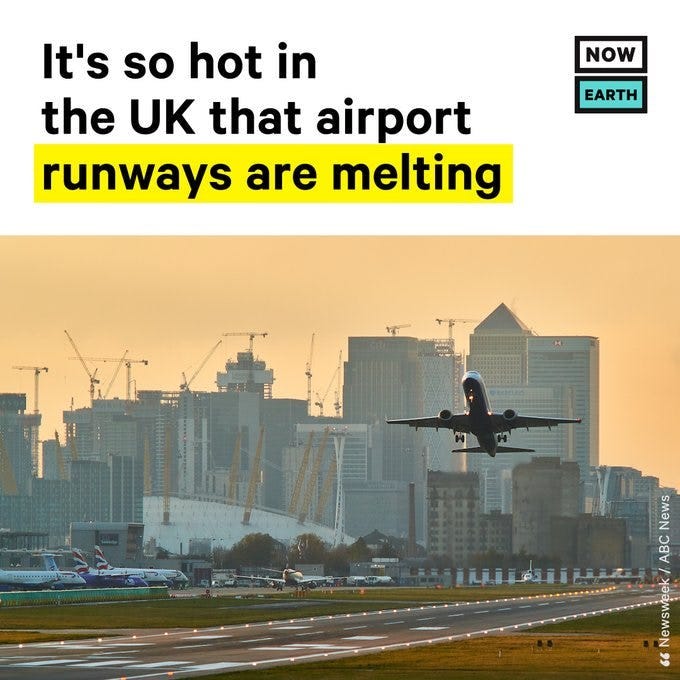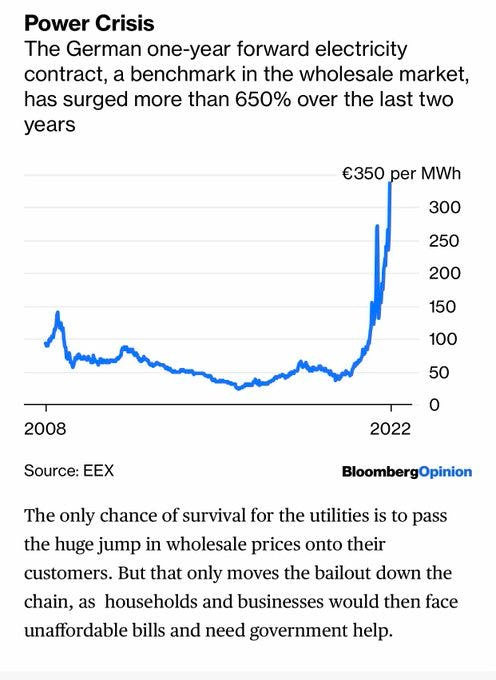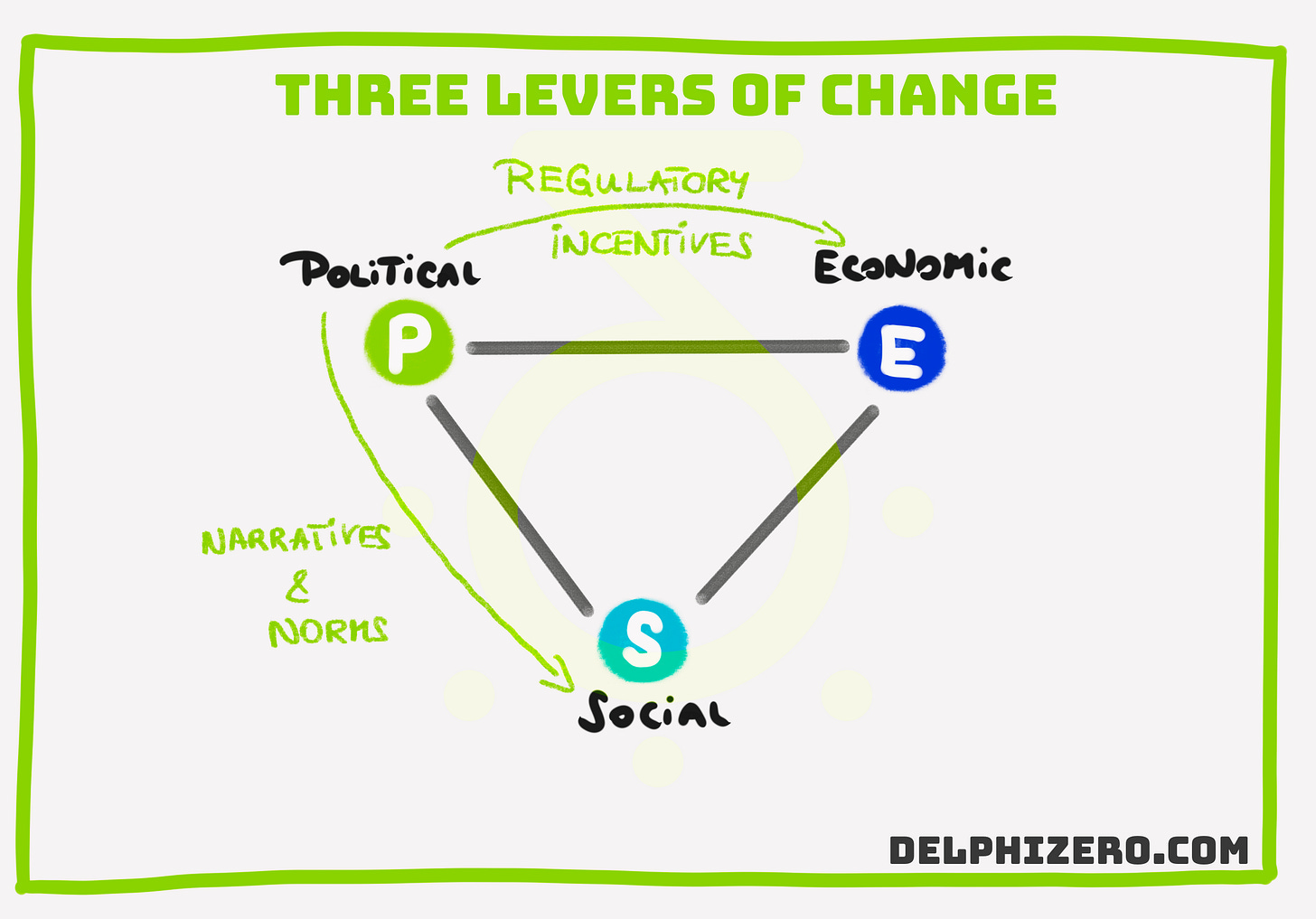Democratic Dominoes
How Crises Tip the Political Agenda
Climate is not a technology problem but a story problem.
Delphi Zero is a consultancy and newsletter about the narrative potential of climate.
My goal with Delphi Zero is to get people excited about a Net Zero future.
Sometimes, I write utopian sci-fi short stories, and sometimes like today, I analyze the current news cycle. The smallest common denominator: By the end of each essay you should feel a little bit more optimistic about the future.
Today I’ll explore why the climate and energy crises of 2022 might finally trigger political action.
Democratic Dominoes: How Crises Tip the Political Agenda
By Art Lapinsch
Europe is on fire 🔥
Unfortunately, this is not a figure of speech but a sad reality. In the West and the South, wildfires are destroying forests and livelihoods. In the East, missiles are turning landscapes and cities into hell on earth.
The picture is similar all across the planet. There’s no way around it: 2022 has been a total bummer, and it looks like the worst is yet to come.
But you might say “Art, isn’t this a newsletter about optimism and positivity?” to which I reply, “Yes… but we still need to face reality sometimes before we can start seeing the light.”
This summer’s devastating heat waves and Russia’s invasion of Ukraine are tragedies. Yet they might become an important trigger to avoiding climate catastrophe in the long run.
Governments and policymakers all across Europe and the US are experiencing a reality-check of Biblical proportions. To quote a legendary philosopher:
“Everyone Has a Plan Until They Get Punched in the Mouth” - Mike Tyson
Europe got knocked out cold. It’s time to revisit the game plan.
Political Accelerators: Crises as Catalysts for Change
In general, I’m cautiously pessimistic about politicians and their ability to change the world for the better. Usually, it is all talk, no walk.
But 2020 was a peculiar year. It was the first time in my memory that I perceived political adaptation on a large scale. At first, the COVID-19 pandemic made everyone run around like headless chickens. But once it really dawned on people that this is not going to be over in 2 weeks you could see the first signs of political adaptation.
Crises are catalysts for change. Political, economic, and social. I have a hunch that 2022 might be such a year for climate activism and energy transition.
“There are decades where nothing happens, and there are weeks where decades happen.” - Lenin
Climate and Energy: From Sideshow to Primetime
In the past, dealing with climate change and energy topics has been a political sideshow.
The Green parties around Europe have pushed this agenda for many decades but it was mainly the other political parties who called the shots. Traditionally, the majority of voters had other priorities: a strong economy, good healthcare, affordable housing, and so on.
Up until recently, climate and energy were not top-of-mind topics. You could tell by how a UK-based meteorologist - who correctly predicted this week’s heatwave - was berated on live television for speaking the truth. You can’t make this shit up. Reality is stranger than fiction.
Single voices rarely bring about systemic change unless they move one of three critical levers:
Society: People care so much about climate that they become active → votes; protests; behavioral change; etc.
Economy: Businesses have a financial incentive to promote climate → research & development; production; marketing; lobbying; etc.
Policy: Policymakers realize that climate is an important topic for their voters → campaigns; policies; regulations; etc.
I believe we are seeing the momentum shifting in a positive direction. Why now?
Heat waves are causing destruction right at home. It’s no longer a news headline from a distant country. This nightmarish 2022 is starting to kick those voters in the nuts.
From Peacetime Politics to Wartime Politics
One way to think about the current state of affairs is to look at society through Maslow’s Hierarchy of Needs.
For politicians, this means that the circumstances of their voters can change significantly.
If times are good, make sure your people can thrive.
If times are tough, make sure your people can survive.
The worst one can do is to do nothing.
This is an oversimplification but it should do for the following thought experiment: Are we seeing political adaptation in regard to the current crises?
🇬🇧 UK’s Governmental Turmoil and a Shift Towards Climate Topics
Historically, hot regions like Spain and Greece have been tormented by wildfires. But massive wildfires in the UK are a first.
Now, after just a few days of this heatwave, we have seen truly crazy headlines from our favorite island nation. This particular one caught my attention 👇
The heat wave that’s gripped Europe has made it so hot in the UK that airport runways are literally melting in the sun.
Runways at the British Royal Air Force’s Brize Norton base and Luton Airport melted on July 18, halting flights in and out of the airports.
The UK is an island. It is rather unlikely that an enemy’s army would board the commuter train from Paris to London. Hence, enemy approaches can only happen by water or air. The UK needs an operational air force to defend itself. The safety of the population is at risk.
If this isn’t a code red for national security then I don’t know what is 🚨
The UK is also experiencing a governmental crisis and Prime Minister Boris Johnson was pressured by his own party to resign. This means a re-shuffling of party leadership and the two frontrunners Rishi Sunak as well as Liz Truss used this opening to adjust their political agenda.
Sunak (definitely) and Truss (arguably) seem to get that too, so expect to hear a lot more around Tory-friendly ways of framing climate and environmental action.
The good news is that the Tories are adapting their agenda.
🇺🇸 The United States of Climate Denial
The United States is one of the main reasons we are in this climate disaster and at the same time is one of the key allies we need in our fight against climate catastrophe.
The United States is on track to reduce its emissions significantly and return back to its 1990 emission levels. It’s good, but it ain’t enough.
If you have been following the news recently, you might have heard that the Supreme Court of the United States revoked the EPA's right to uni-laterally regulate greenhouse gas emissions from the power sector. On top the other hand, the U.S. Congress blocked an important climate-related bill agreed on a generational climate bill. These developments are missing the mark.
Also, 200 million Americans are starting to feel the results of global warming and their safety is at risk.
That’s why the President of the United States took to drastic measures and announced an upcoming Executive Action to tackle the Climate Emergency.
My message today is loud and clear: Since Congress is not acting on the climate emergency, I will.
And in the coming weeks my Administration will begin to announce executive actions to combat this emergency.
The positive note here is that climate action is finally becoming a major policy and campaigning topic. In addition, “dealing with climate change” is relatively speaking the most important policy topic for younger generations.
The good news is that parts of the US government are adapting to the realities at hand.
🇩🇪 Germany’s Energy Policy Fiasko and Europe’s Forced Hand
I’ll let this meme do the talking 👇
Energy security is currently dominating the public and political discourse. There is some cleaning up to do.
Here are three reasons why:
Energy Shortage: Europe is currently experiencing a shortage of natural gas as a result of Russia’s invasion of Ukraine (EU: upcoming energy embargo of Russian energy; RUS: politically-motivated export reduction/stop).
Price Explosions: The supply-reduction results in rising costs of natural gas and an explosion in electricity prices. Utility providers usually have their contracts locked in for one- or two-year periods. If there’s a sudden price increase there are two scenarios that are bad: (1) utility providers bear the financial loss and run the risk of becoming insolvent, or (2) price increases are being passed onto the consumers and you risk accelerated inflation. Both cases are no bueno. Governments in France and Germany are currently preparing to nationalize major utility providers.
Jean-Michel Glachant@JMGlachant
Power Wholesale Price at €350 per MWh in Germany
EU utilities can survive such levels only if the pass these prices to the buyers
But how can households & companies afford such prices?
What help will state budgets be asked to bring?
Germany’s energy security is a train wreck and as a result, Europe’s energy security is a train wreck. We are entering a time where the safety of Europe’s population is at risk.
Energy and climate are already dominating European public discourse and it will finally force the hand of politicians. We are already seeing two signs of political adaptation:
Nuclear Energy: Germany is starting to re-consider the shutdown of its three remaining nuclear power plants. If you are familiar with German culture then you understand that this is a big deal.
Supplier Changes: Across the board, European governments are shifting gas import contracts from Russia to countries like Qatar and Azerbaijan.
Energy Rationing: The EU is proposing to reduce gas demand by 15% between August and April. This point is already a massive point of contention among the EU countries. Every country has a different energy mix (i.e. sources of energy to meet their energy needs). Germany stands to lose the most since they depend to a large extent on Russian gas imports but southern EU countries already signaled that they are not willing to support the energy austerity. Payback is a bitch if you are Germany and forced austerity packages onto many southern EU countries during the debt crisis of the 2010s.
Russia’s invasion of Ukraine is highlighting the importance of transitioning from fossil fuels to renewables. Renewables are domestic fuels and hence a safer bet in terms of energy security.
The good news is that Europe is finally starting to address the challenges at hand.
Tipping the Political Agenda: When Democratic Dominoes Start to Fall
So what’s the silver lining?
The various crises in 2022 have put the safety of large populations at risk. We are currently experiencing a shift from peacetime priorities to wartime priorities. From thriving to surviving.
In some countries, it means battling heat waves for the first time. In other countries, it means dealing with the repercussions of a major war. Those are climate and energy crises respectively.
Both crises have one thing in common: The energy transition from fossil fuels to renewable energy sources is an important path to solve those crises.
Climate Crisis: A reduction in fossil fuel usage means a reduction in CO2 emissions. Less CO2 emissions mean a slower rate of global warming.
Energy Crisis: A reduction of fossil fuel usage means becoming energy import independent. Less dependence on a supply-constrained and expensive energy source like gas means less risk of energy shortage or economic distress.
At the beginning of this essay, I asked the following question: Are we seeing political adaptation in regard to the current crises?
Democratically-elected leaders depend on votes. Hence, it is rational for them to use all the available tools to address these crises. This means regulation, stimuli, and narratives. I believe we do start to see positive signs in the UK, the United States, and the European Union.
There’s still a very long way to go and a lot of work to be done, but at least climate change and energy transition are no longer political fringe topics.
The first dominoes started falling and the momentum is finally on our side.
Dear reader, if you want to discuss climate tech or energy systems (questions; topics; jobs; opportunities; etc.), please reach out to me.
Also, if you enjoyed this essay, I’d appreciate it if you could share it with people who might find this interesting. Thank you 🙏
I’m looking forward to hearing from you,
Art
🙏
Thanks, Sara, Chris, and Finn for discussing and editing.
The original of this story appeared first on Delphi Zero.
















